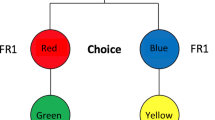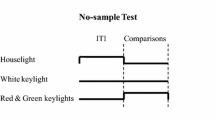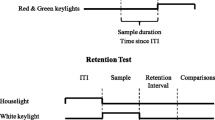Abstract
This study attempted to determine if animals’ conditioned responding could be controlled by an analog of the familiar 12-hour clock in which the significance of a reading is conditional upon other stimuli. The periodic availability of grain reinforcement for food-deprived pigeons’ keypecking was signaled by a conditional line tilt clock. The orientation of lines on the key during successive thirds of odd numbered intervals was horizontal, oblique, then vertical. Reinforcement was available during vertical. The orientation during successive thirds of even numbered intervals was vertical, oblique, then horizontal. Reinforcement was available during horizontal. The houselight was illuminated only during odd numbered intervals. Thus, vertical and horizontal signaled either nonreinforcement or reinforcement, conditional upon whether the houselight was on or off. Under these conditions most pecking occurred during the final third of all intervals. Clock control of pecking was demonstrated during two types of tests. In one, the clock was sped up or slowed down by shortening and lengthening the fixed interval. These manipulations did not affect the usual temporal pattern of responding; pecking still occurred only during the last portion of the interval. In the other type of test, the usual order of presentation of the line tilts was changed. This manipulation did affect the temporal pattern of pecking. The birds seemed to learn two types of conditional discriminations: one between houselight, line tilts, and reinforcement availability; the other between certain orders of events in the clock sequence and the availability of reinforcement.
Similar content being viewed by others
References
BARON, A., & GALIZIO, M. 1976. Clock control of human performance on avoidance and fixed-interval schedules. Journal of the Experimental Analysis of Behavior, 26, 165–180.
CAPLAN, H. J., KARPICKE, J., & RILLING, M. 1973. Effects of extended fixed-interval training on reversed scallops. Animal Learning & Behavior, 1, 293–296.
DONAHOE, J. W. 1970. Stimulus control within response sequences. In J. H. Reynierse (Ed.), Current issues in animal learning: A colloquium. Lincoln, Nebraska: University of Nebraska Press.
FERSTER, C. B., & SKINNER, B. F. 1957. Schedules of reinforcement. New York: Appleton-Century-Crofts.
FRY, W., KELLEHER, R. T., & COOK, L. 1960. A mathematical index of performance on fixed-interval schedules of reinforcement. Journal of the Experimental Analysis of Behavior, 3, 193–199.
KENDALL, S. B. 1972. Some effects of response-dependent clock stimuli in a fixed-interval schedule. Journal of the Experimental Analysis of Behavior, 17, 161–168.
SEGAL, E. F. 1962. Exteroceptive control of fixed-interval responding. Journal of the Experimental Analysis of Behavior, 5, 49–57.
Author information
Authors and Affiliations
Additional information
This study was supported by a Natural Sciences and Engineering Research Council Canada Operating Grant (to Donald M. Wilkie) and a Postgraduate Scholarship (to Marcia L. Spetch). M. Gordon, B. Kirkbride, L. Leader, and R. Summers assisted with the experiment.
Rights and permissions
About this article
Cite this article
Wilkie, D.M., Spetch, M.L. Control of Pigeons’ Keypecking by a Conditional Clock. Psychol Rec 30, 251–260 (1980). https://doi.org/10.1007/BF03394675
Published:
Issue Date:
DOI: https://doi.org/10.1007/BF03394675




